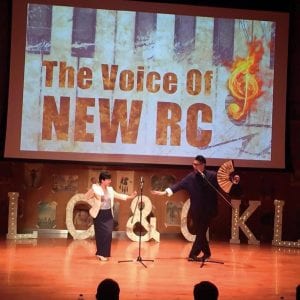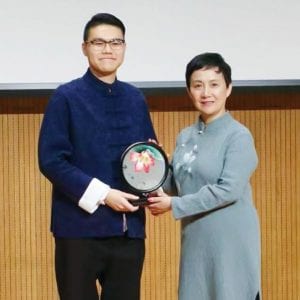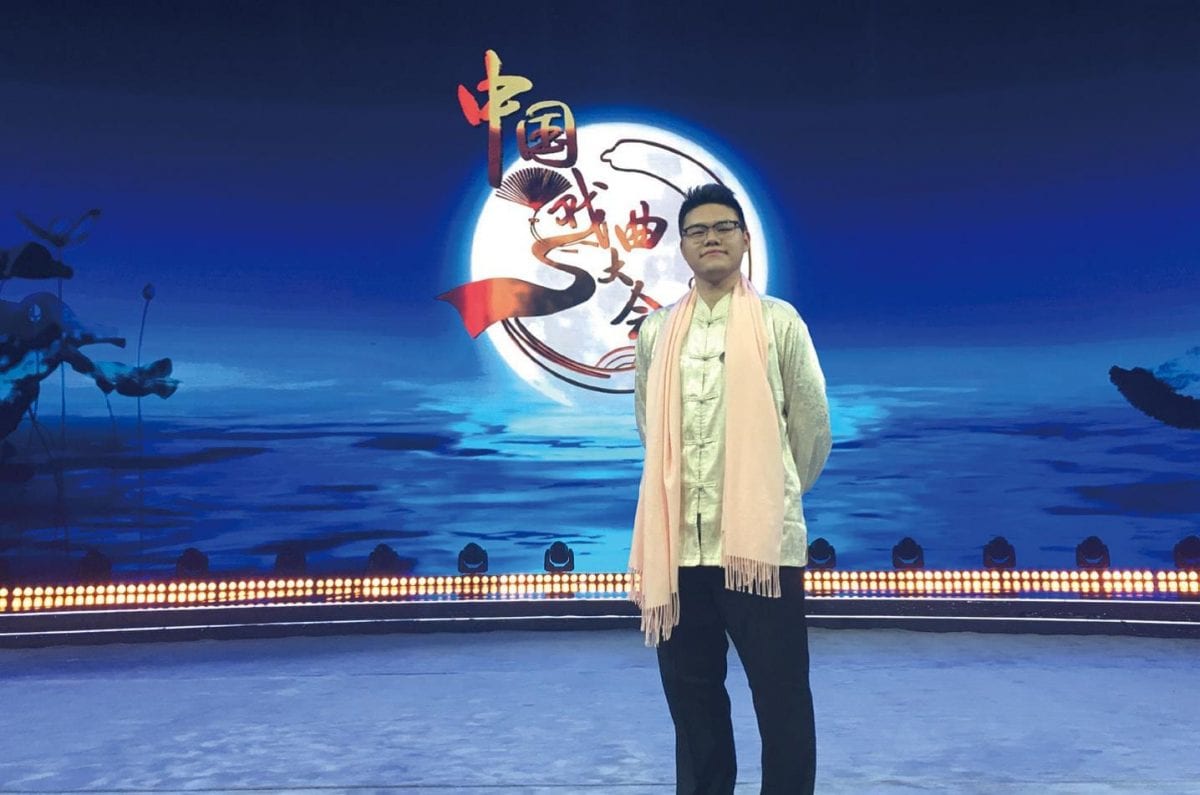‘When it comes to Chinese opera, there are two kinds of people: those who love it, and those who love it without realising it,’ says Daniel Kwan, a third-year student from the Department of Chinese Language and Literature, who is a bona fide Chinese opera enthusiast.

Daniel Kwan performs a Kunqu opera song at the welcome dinner for participants in the first forum for university presidents from China and Portuguese-speaking countries held at UM
Daniel Kwan with the renowned Kunqu opera artist Xing Jinsha at a Chinese opera forum held at UM
Love and Learning since Childhood
Kwan’s love affair with Chinese opera literally began as ‘love at first sight’. One day young Kwan passed by a shop in Shanghai that sold all sorts of Chinese opera paraphernalia, when his eyes caught sight of the elaborate costumes in the shop. He was fascinated by the costumes, and this fascination gradually translated into an interest in Chinese opera. He was so interested, in fact, that he became addicted to any TV programme that had to do with Chinese opera. He would imagine himself singing Chinese opera while wearing beautiful hair accessories. Sometimes he would even sing along with the artists on TV. This self-taught learning gave way to formal training in Peking opera when he entered third grade in primary school. Unfortunately, his passion for opera was not music to his teachers, who often scolded him for spending all his time on the hobby to the neglect of his studies.
But to Kwan, the opposite was true. Chinese opera has always been a safe haven that helps him relieve stress.‘When I encountered dif ficult maths problems in my last year in junior high, I would spend two to three hours trying to solve them. But if I listened to some Chinese opera pieces, my mind became more active, and I became more ef ficient in schoolwork,’ he says. In senior high school, when he had already studied Peking opera for many years, Kwan by chance heard a Kunqu opera piece by two famous artists. He was hooked. In less than six months, he mastered ten songs in this genre.

Daniel Kwan performs the Peony Pavilion along with some senior students at UM
Promoting Opera on Campus via an Association
To better appreciate the profound meanings of the lyrics in Chinese opera songs, Kwan chose Chinese for his college major. But after coming to Macao, he realised that compared to mainland China, Hong Kong, and Taiwan, there are less opportunities in Macao for young people to know Chinese opera. This inspired a sense of mission in him to promote Chinese opera to UM students. He points out that the ancient-sounding pronunciations in Kunqu opera songs have led some young people to think that this is an outdated art form removed from reality, but actually the opposite is true. As a form of folk art, it is rooted in real life and depicts real life experiences.
In his freshman year, Kwan met Prof Tam Mei Leng from the Department of Chinese Language and Literature and a group of senior students who share his passion for Chinese opera. They jointly established the Chinese Opera Society under the Students’ Union, and the society now has more than 60 members. ‘You don’t have to learn to sing Chinese opera, but we want to give UM students a chance to learn more about it, so they can appreciate its beauty or maybe even fall in love with it. Sometimes I would tell my classmates about Yang Guifei’s jealous rivalry with Emperor Xuanzong’s other concubines and her last sad farewell with the emperor in The Palace of Eternal Life, and they were all interested to hear the story,’ he says.
Daniel Kwan talks about the development of Chinese opera in Hong Kong and Macao in a CCTV programme
Writing an Opera Based on a Classic Story
Kwan is now writing a Kunqu opera based on the story of Lady Xi from the Spring and Autumn period, who was known for her peerless beauty. He explains that while there are many Chinese opera singers, the number of playwrights is declining. Indeed, the number of classic Kunqu opera plays can be counted on one hand. ‘Peony Pavilion is one. The Palace of Eternal Life is another. But actually many stories from ancient China are great material waiting to be discovered. And that’s what I am trying to do,’ he says. ‘The stories that were not mentioned in the original book can be presented in the opera.’ He looks forward to a way of life that will allow him to continue to pursue his passion after graduation from college. He says, ‘Wouldn’t it be wonderful if I can become a university teacher after graduation and write Kunqu opera plays on a part-time basis?’
Source: My UM



